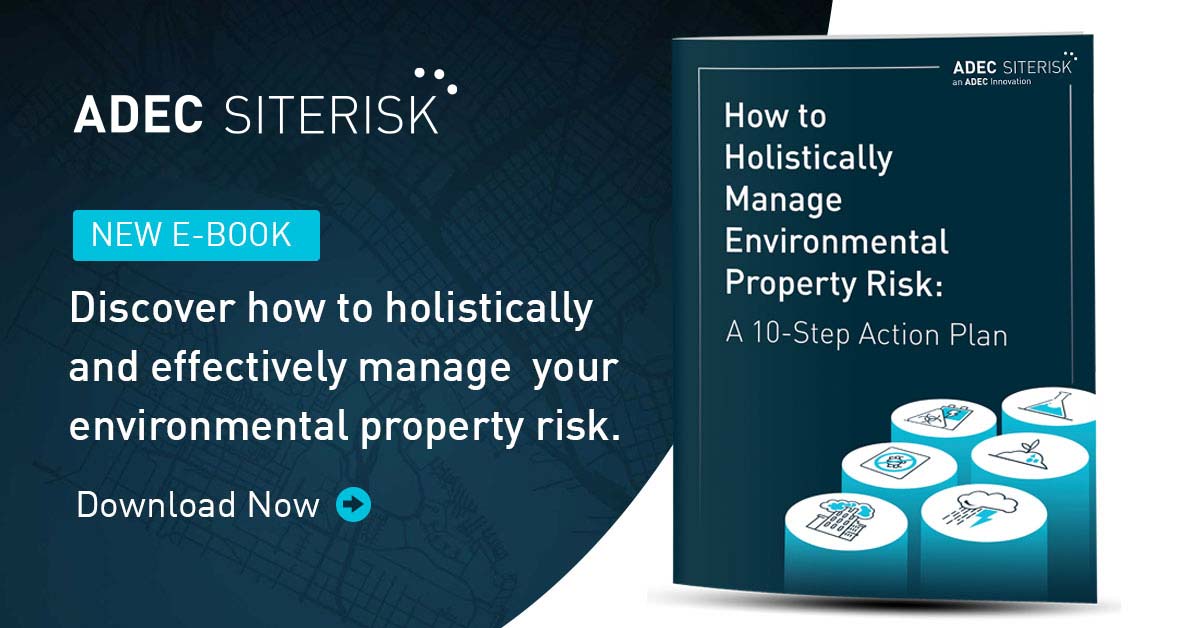How to Holistically Manage Environmental Property Risk
Article
Today property owners and managers must prioritize sustainability and secure long-term resiliency while maximizing profit. This often feels like an overwhelming challenge, and not everyone knows where to begin.
Let’s learn some practical approaches to effectively evaluating and managing environmental property risk.
Environmental Challenges
In the face of environmental impacts on real estate, resilience is essential – it is no longer optional. But now we can prioritize sustainability to create greater efficiencies while still addressing the business demands of stakeholders, because sustainability normally improves profitability. Adopting long-term sustainable practices will also reduce and help prevent the worst effects of business activities from overwhelming an environment that is currently hanging in the balance. To achieve this, we need to start managing stakeholder expectations for a transition into prioritizing environmental property risk management.
Manage Stakeholder Expectations
Shifting the mindset of stakeholders to prioritize sustainability is one of the first steps. Part of this challenge is communicating in such a way that the complexity of sustainability becomes clear. When you examine a complex system, such as the reduction of environmental real estate risk for an organization, it gives you insights about where profits can come from and how to cut costs.
Learn About Tax & Monetary Incentives
Implementing measures to fight environmental risk can curb long-term operating expenses. Redevelopment and upgrades with sustainability in mind, especially where government incentives are available, is a win for the developer and a win for the community, able to curb long-term operating costs with respect to future energy demands.
Invest in Preventative Measures
In your resilience planning for real estate, you can address anticipated hazards with mitigation, building upgrades or procedural changes that help minimize or prevent building damage and/or loss of life from an extreme environmental hazard. Examples of this include retrofitting a building in a seismically active area or relocating critical electrical infrastructure above anticipated flood levels.
Prioritize Critical Systems
Building resilience requires prioritizing critical systems, such as energy-efficient heating, cooling and ventilation systems, and ensuring that backup power sources are located on higher ground and away from flood-prone areas. Managing stakeholder expectations means communicating “polluter pays” risks and risks that threaten a brand while also making sure stakeholders understand that every risk avoidance measure helps the business consider potential opportunities for growth.</p
Inform Yourself About Upcoming Regulations
Upcoming deadlines and increased legislation and regulation have created a sense of urgency among Commercial Real Estate (CRE) investors and occupiers, and retrofitting CRE buildings could be a pivotal next step. Making sure you remain aware of such upcoming regulations and adjustments to current laws is critical to a comprehensive environmental real estate risk management plan.
Leverage Technology, PropTech and Internet of Things (IoT) for Net Zero
As regulatory agencies and NGOs, such as the Science Based Targets initiative (SBTi), continue to require improved data collection and monitoring, assessing, benchmarking and reporting on real estate asset metrics with respect to environmental, social and governance (ESG) criteria, it will become necessary to switch to technologies that save time and money for you and your team.
Create the Ideal Employee Experience in Homes & Buildings
As new ways of working have emerged in the post-COVID era, creating the best workplace experience for employees has become a central theme. For those returning to work in buildings, for example, there is a direct link between a greener, healthier and more efficiently managed building and a happier workforce.
Share Knowledge
Another important aspect of building resilience on a global scale is the need for knowledge sharing and collaboration between different regions and stakeholders. By sharing best practices and lessons learned, regions and organizations can work together to build more resilient real estate assets and communities.
Make Continual Environmental Real Estate Risk Improvements for Greater Value
As you progress in your environmental property risk management and ESG programs, you’ll want to make sure to also integrate a plan for continual improvements over time, always looking for opportunities, changes in regulation and markets and emerging technological solutions.
Communicate Your Environmental Real Estate Risk Management Progress
As with managing stakeholder expectations, achieving the greatest transparency with the outside world will require you to dedicate time and effort to communicating your progress. Start by involving internal stakeholders and collaborators throughout your value chain. Then turn to a software solution to help you immediately assess your status and develop reports for internal and external stakeholders to maximize your transparency and outreach as you progress.
For a complete, in-depth overview for how to holistically manage your environmental property risk…
Sustainability Tooltip: Implement a comprehensive disaster preparedness plan that includes backup power sources, emergency communication protocols, and regular safety drills to help optimize your property’s resiliency in the face of environmental hazards and ensure the safety of all occupants.










